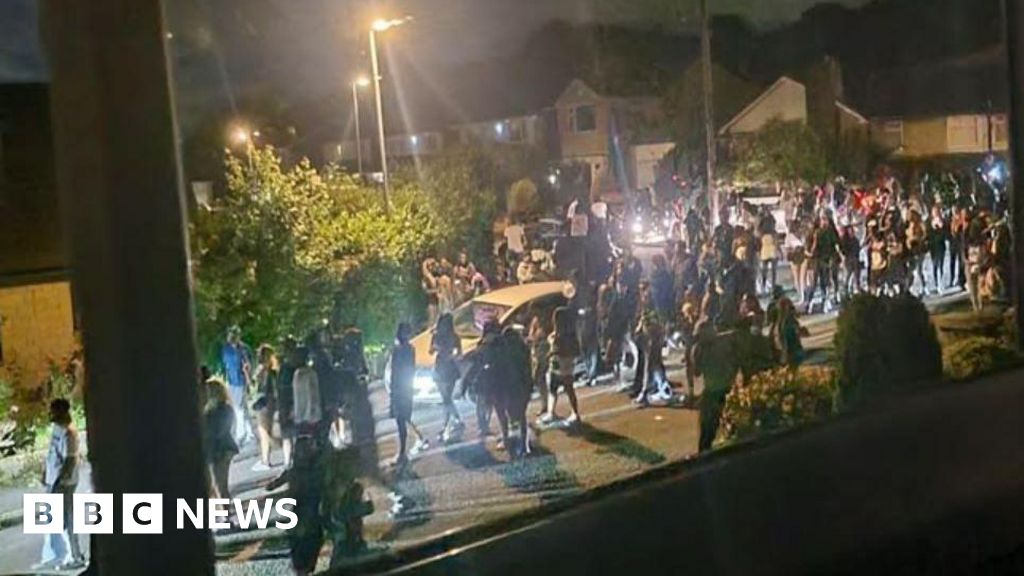
Residents in a village that flooded during Storm Dennis say they feel “angry” and “abandoned” after flood defences were rejected due to their cost.
Building a taller flood wall or buying the most at risk houses in Ynysybwl, Rhondda Cynon Taf was “not economically viable”, said the environment body, Natural Resources Wales (NRW).
Home owners said they were left fearing for the safety of their families.
NRW said it would “not walk away from the community”.
Paul Thomas has lived on Clydach Terrace in Ynysybwl for 40 years. His home was flooded during Storm Dennis in 2020.
He said: “They may not be walking away, but they’re certainly doing nothing.”
The 66-year-old said residents had been told “money was no object”, but said they now feel like they have been “abandoned”.
He added: “There’s a risk to life”.
 Paul Thomas
Paul ThomasMr Thomas said the water level was above his head when it entered his home in 2020.
“I was knocked through the wall, the water came in behind me, I didn’t know what was up what was down, I managed to swim to the back of the property,” he said.
“I swum across my backyard onto my extension roof and jumped in through the bedroom window.
“To live here, the danger that we are facing is just too great”, he added.

Water from the Nant Clydach tributary flooded 16 houses on Clydach Terrace during Storm Dennis.
The water overtopped the highway wall between the tributary and the street.
NRW said it looked at several options to manage the flood risk in the area, including building a raised flood defence wall, or buying the most at risk homes.
But the environment body said “neither option is close to being economically viable under the UK and Welsh government funding rules for flood risk management purposes that NRW must follow”.
It added that it “recognises the flood risk remains and will not walk away from the community”.
 Paul Thomas
Paul ThomasPaul’s children and grandchildren live in the houses either side of his. He said he feared for their safety every time it rained heavily.
“Weather forecasts and that river rule my life now, it’s taken a toll on us,” he said.
“Not just me, my grandson, when it rains, he’s terrified, he feels sick, he just wants to go, and everyone is exactly the same.
“It’s a nightmare,” he added.
“We have waves coming up the street – it’s a massive amount of water, it’s powerful enough to push the front door in.
“We can die, it’s as simple as that, we can die.”
Alison Linehan also lives on Clydach Terrace, and said, “we are living in fear and they just don’t want to do anything for us”.
“As soon as the winter comes now we will be panicking.”
She said she would like to see the flood wall between the water and her home made taller.
Graham Watkins was born on Clydach Terrace, and said he was “fed up” with NRW and would like to see the river dredged and the wall raised.
“Before long people in this street won’t get insurance, because the cost of it is so much – I find it very difficult to afford the insurance on the house,” he said.

Rhondda Cynon Taf council said it would meet with residents “to consider potential options”.
“Nothing is off the table, including acquisition of properties where necessary, and we will consult with impacted residents on all future options,” a spokesperson for the council added.
NRW said the topography of the area near the river “presents a challenging risk” and said that during extreme rainfall “flooding can happen rapidly and to significant depths”.
It said the proposed flood defence wall would need to vary along its length between 3.5m and 4.5m (11ft 6in and 14ft 9in) above the road to provide a good level of protection.
NRW said that purchasing the most at risk properties was found “not to be cost-effective to be eligible to receive Flood Defence Grant in aid funding from the Welsh government”.
It said it was “committed to working with the community, the local authority and other partners” to find other solutions.
David Letellier, Head of Operations South Wales Central for NRW, said: “We know how deeply flood risk affects people’s lives and wellbeing, and we understand this will be disappointing news for residents.
“This was a thorough assessment of what’s possible in Ynysybwl, and although we cannot take forward a major scheme at this time, we are not walking away.
“We remain committed to working with the community, the local authority and other partners to explore what else can be done to manage the risk and support residents.”




